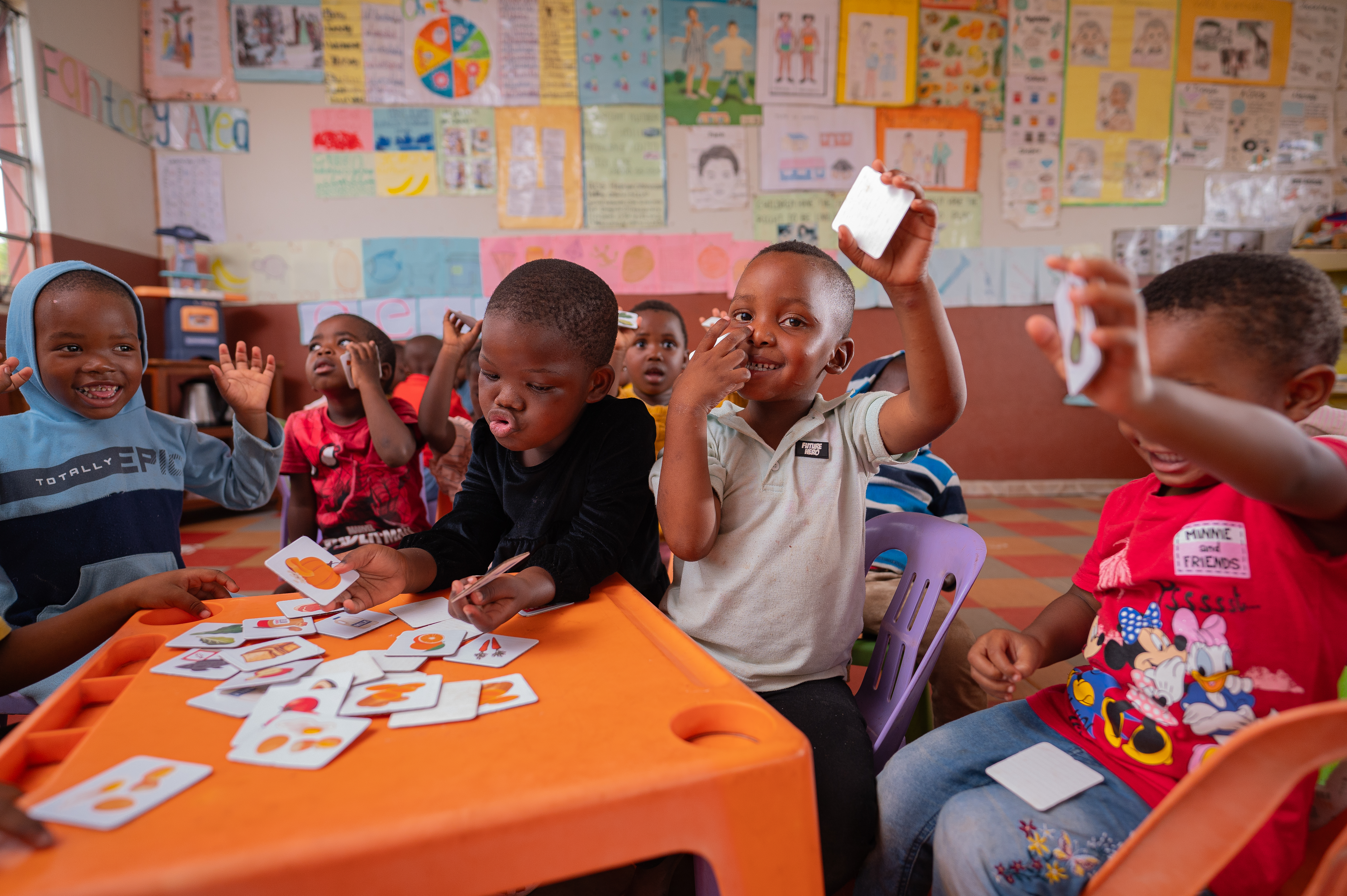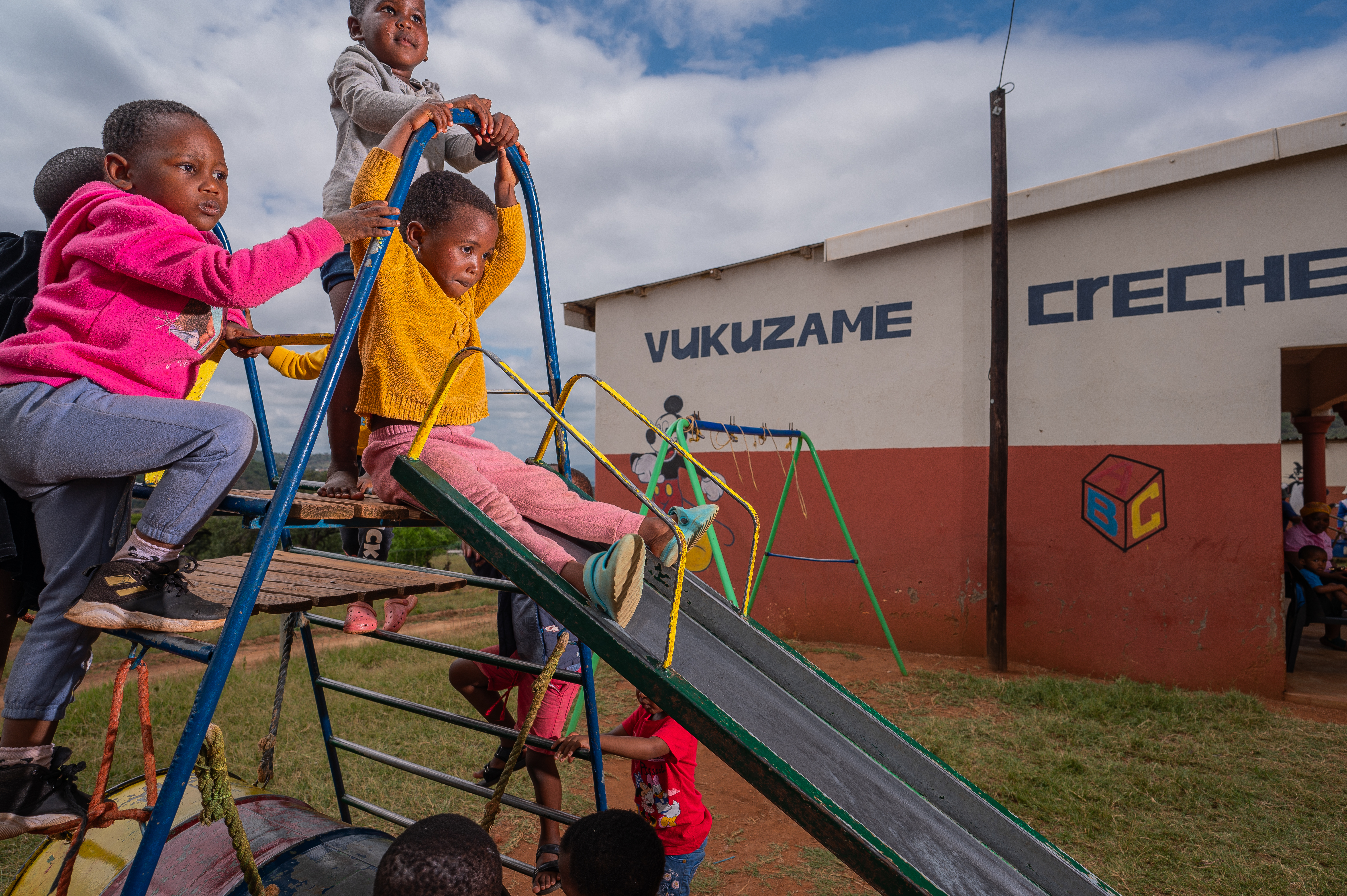Everyone Gets to Play: A Collective Impact Model for Young Children
12 Aug 2025
Everyone Gets to Play is a values-driven model that demonstrates what’s possible when diverse partners align around a shared commitment to young children. The outcome of the model is a collective impact approach designed to strengthen the systems of care surrounding children from pregnancy through the early years of life.
Developed and refined through years of collaboration, this model shows what happens when government, civil society, and business work together— not just in theory, but in practice. The result is a localised, sustainable system that delivers real outcomes for children and families. The model is currently being implemented and adapted across eight under-resourced communities in South Africa.

What Makes Everyone Gets to Play Different?
This model is built on the belief that no single actor can solve complex challenges alone. Instead, Everyone Gets to Play brings stakeholders into structured, ongoing collaboration to deliver a basket of essential services for young children. These services span across sectors and are delivered in a coordinated and community-rooted way.
The Basket of Services includes:
- Health: immunisation, growth monitoring, deworming, and antenatal/postnatal support
- Nutrition: breastfeeding promotion, food support, growth monitoring, and meal access
- Early Learning: access to play-based learning and ECD centre support
- Responsive Parenting: parenting education through the Eat Love Play Talk (ELPT) programme
- Protection: birth registration, safety, and access to social grants
- Play & Stimulation: caregiver-child play, story-telling, outdoor play, and creative expression
Key to the integriton of the basket of services is the intenrtional and proactive weaving of services and those driving the serives together through community platforms, infrastructure and trusted relationships.
A Backbone for Coordination
The DO MORE Foundation plays the role of backbone organisation, which means holding the centre convening partners, building shared ownership, and enabling coordination across sectors. Rather than leading from the front, the backbone function supports everyone to lead from where they are.
As one external partner put it:
"What sets DMF apart is how they hold the process together—creating opportunities for people to connect, unlock resources and work more closely together.”
That is the invisible and powerful work of coordination, alignment, and trust-building.
Principles that Drive the Model
Everyone Gets to Play is underpinned by five core Collective Impact principles, closely aligned with cooperative values:
- Common Agenda: A shared vision to ensure every young child receives comprehensive, quality care. This agenda is built collaboratively and reviewed regularly with all stakeholders.
- Shared Measurement: Partners contribute to a joint M&E framework, tracking reach, inclusion, quality, and service delivery across the full basket. Data is discussed in multi-stakeholder spaces and guides decision-making.
- Mutually Reinforcing Activities: Each actor plays to their strengths—government departments deliver essential services, NGOs train ECD practitioners and parent champions, and businesses provide logistical and in-kind support.
- Continuous Communication: Monthly technical committee meetings, Young Child Forums, and annual Imbizos ensure learning, reflection and responsiveness.
- Collective Action: The model thrives because everyone is in it together. When a village lacks access to early learning, partners co-develop a plan. When children are missing immunisations, stakeholders mobilise jointly. It’s not about competing mandates—it’s about shared responsibility.

Young Child Forums and Local Leadership
The Young Child Forums (YCFs) are the living expression of the model’s cooperative nature. These are self-organised groups of ECD principals and practitioners who meet regularly to share knowledge, report challenges, and take action in their communities.
These forums are not formalised structures, but they are powerful accountability and mobilisation engines. They embody the spirit of everyone gets to play because ECD leaders, teachers, parents, and community members are active roleplayers in the moblication of the community to reliase the rights and needs of young children.
Deep Partnerships and Place-Based Investment
Everyone Gets to Play is not a short-term campaign or one-off pilot. It is a place-based, long-term approach that depends on deep, consistent investment into local systems. NGOs, businesses, and government partners make a deliberate choice to stay the course; ongoiningly in the same geographic communities.
This is what builds relational infrastructure. It’s what builds trust between ECD centres and clinics, between ward councillors and NGOs, between businesses and parents. It is this long-game commitment that creates real systems change.
Business partners like RCL FOODS and SELATI Sugar are not just funders—they are engaged participants. They offer time, transport, local insights, and advocacy. Similarly, local NGOs tailor their programmes to the context, responding to what’s needed by the community.
Outcomes That Matter
The model is being tracked through a robust shared monitoring framework, with promising results:
- Nearly 6,000 children reached across implementation phases
- Over 90% parent participation in Eat Love Play Talk parenting education sessions
- Expanded early learning access in previously unreached villages
- Increased interdepartmental coordination, reducing duplication and increasing efficiency
- Strengthened community ownership through YCFs and parent leadership
- Transfer of techncial and ecosystem building skill to implementing parents who employ local young people and professionals.
Systemic Challenges That Remain
While the Everyone Gets to Play model is demonstrating clear results, it also reveals persistent systems-level barriers that continue to exclude the most vulnerable young children. These challenges are embedded in how services are structured, funded, and accessed.
Children with disabilities, undocumented children, and those living in remote rural areas remain disproportionately excluded from the full basket of services. This is not due to a lack of will, but due to fragmented referral pathways, inaccessible infrastructure, data blind spots, and limited frontline capacity to respond to diverse needs. Issues in integration of services remains constant over the communities.
Everyone Gets to Play is about ecosystem building Our teams work passionately and with intention to to build local systems of care that are cooperative, data-informed, and community-owned. It’s a model for making national policy tangible and responsive at local district level in South Africa.
As Community Development Lead, Jabu Mthembu Dlamini reflects:
“This work is about staying the course, building relationships, holding space for dialogue, and staying committed to what we can do together that we cannot do alone. It’s not a quick fix, it’s a long game.”
Everyone gets to play. That’s the model. That’s the invitation.